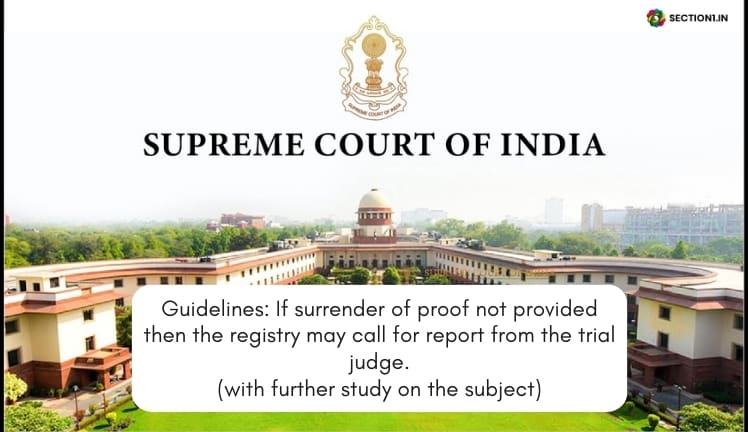STATE LEVEL COMMITTEE OF HOME (PRISON-IV) DEPARTMENT RECOMMENDATION OF RELEASE WAS DISMISSED BY T.N. STATE GOVERNMENT
8. In the alternative, learned senior counsel vehemently canvassed that the Appellant should, at least, be given the benefit of G.O.(Ms) No. 64 of the Home (Prison-IV) Department dated 01.02.2018, in view of the long period of incarceration and the fact that the State Level Committee comprising the District Authorities and Prison Department on 16.02.2018 [reference seems to be to the Additional Director General of Police/Inspector General of Prisons Letter No. 4369/PS1/2018] had recommended release of the appellant on account of her undisputed affirmative conduct and long incarceration and thus, the order of rejection of release dated 24.09.2019 by the State of Tamil Nadu vide G.O.(D) No. 1127, on the ground of cruel and brutal nature of the offence, be considered erroneous and needs to be interfered with by this Court.
ANALYSIS, REASONING AND CONCLUSION
10. Having considered the matter in detail, this Court finds that the circumstances in which the Appellant is said to have administered poison to her two sons is clearly reflective of her being under a state of tremendous mental stress. However, despite the best efforts of learned senior counsel for the Appellant, it is difficult to grant the benefit of bringing the case under the ambit of culpable homicide not amounting to murder.
12. In the facts and circumstance of the present case, we find the scenarios put forth by the Appellant not covered under the exceptions enumerated under Section 300 of the IPC. More so, when there was no consent from the persons who were fed and died upon consuming the pesticide administered by the Appellant. In Guruswami Pillai v State, 1991 (1) MWN (Cr.) 153, the father had caused the death of his minor daughter by cutting her throat with a blade and had also attempted to commit suicide. During the trial, it had emerged that both the father and the daughter had taken a joint decision that they should end their lives. And thus, in that background, both with regard to mental status, social status, financial status and the attending circumstances, the High Court therein had found it prudent to give a benefit by converting the conviction from Section 302, IPC to one under Section 304 Part I, IPC.
13. Similarly, in the case of Suyambukkani v State, 1989 SCC Online Mad 481 immediately before the incident which led to his wife drowning herself with two children, besides there being a history of her being abused and beaten up by the accused therein, the immediate provocation was that she was beaten up just a day prior to the fateful incident, and also in the morning and at lunch time, which provoked her to immediately try to take her life along with her two children by jumping into a well from where they were taken out. But the two children died, and she was saved and convicted on two counts under Section 302 IPC as also under Section 309 IPC by the trial court. It is noteworthy that even the children were abused by their father as during the post-mortem of the two children, several abrasions were found on their dead bodies and the medical examination of the accused revealed injuries on her body and the stand taken on her behalf was that as a mother she wanted to commit suicide and thought it her duty not to abandon her progeny as she could not reconcile herself with the idea of dying alone, leaving her children behind.
14. As such, both cases pressed into service by the Appellant turned on their own facts. Indeed, they were also noted by the High Court. They need not detain us further. Even on the anvil of State of Andhra Pradesh v Rayavarapu Punnayya, (1976) 4 SCC 382, the Appellant is not benefitted. We have also factored in State of Uttarakhand v Sachendra Singh Rawat, (2022) 4 SCC 227.
15. Be that as it may, the Court is not persuaded to convert the conviction from Section 302, IPC to one under Section 304 Part I, IPC.
GOVERNMENT’S REASON FOR REJECTION OF PREMATURE RELEASE
16. However, on the issue of premature release, it is not in dispute that the benefit of premature release to prisoners in case of life convicts is minimum completion of ten years of incarceration as on 25.02.2018, and for such purpose in G.O.(Ms) No. 64 dated 01.02.2018, there is a State Level Committee empowered to make such recommendations. In the present case, the positive recommendation of the State Level Committee for premature release of the Appellant, has been rejected by the State on the ground that the Appellant had administered poison to murder her two sons to continue her illicit relationship without any hinderance, which act was cruel and brutal in nature.
18. That said, it cannot be simply bracketed as a ‘cruel and brutal’ offence as the Appellant herself was trying to end her life but was prevented by her niece in the nick of time. Moreover, the recommendation of the State Level Committee conveyed by the Additional Director General of Police/Inspector General of Prisons by way of Letter No.4369/PS1/2018 dated 16.02.2018 also notes her undisputed reflective conduct as also the long period of incarceration already undergone.
19. Thus, this Court feels that there is no valid reason/justifiable ground for the State not accepting the recommendation of the State Level Committee for premature release of the Appellant. We are not oblivious to the crime but we are equally not oblivious to the fact that the Appellant (mother) has already suffered at the cruel hands of fate. The reason thereof is an arena this Court would avoid entering.
SUPREME COURT’S REASON FOR SETTING ASIDE THE REJECTION ORDER OF GOVERNMENT
20. For reasons aforesaid, the order of the State of Tamil Nadu ` as contained in G.O. (D) No. 1127 dated 24.09.2019 issued by the Home (Prison-IV) Department, under the signature of Additional Chief Secretary to Government, rejecting the prayer for premature release of the Appellant, is set aside.
21. The Appellant is held entitled to the benefit of premature release as per G.O.(Ms) No. 64 dated 17 01.02.2018 issued by the Home (Prison-IV) Department, under the signature of Additional Chief Secretary to Government.
Appellant released after 20 years.
PARTY: NAGARATHINAM vs. STATE THROUGH THE INSPECTOR OF POLICE – MAY 04, 2023.
https://main.sci.gov.in/supremecourt/2022/6397/6397_2022_2_1501_44245_Judgement_04-May-2023.pdf





